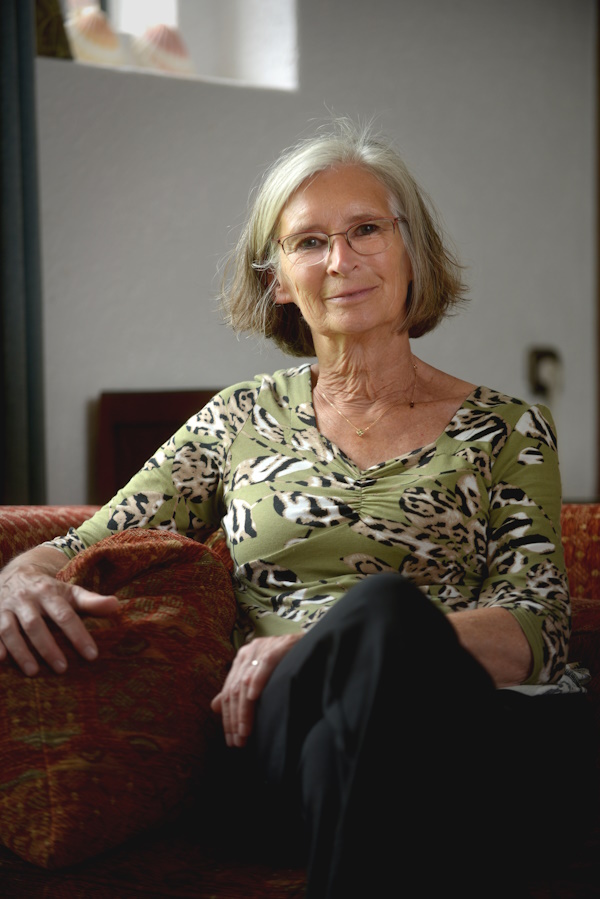Attention to eating disorders seems to have disappeared. Wrongly, says Marlies Rekkers. ‘Everyone knows someone around them who suffers from an eating disorder.’ She teaches her clients to look at their bodies differently. And that helps.
It was a long road to promotion. Marlies Rekkers had been working at the Master’s program in Psychomotor Therapy (PMT) for several years when she suggested Prof. Anita Jansen from the Maastricht department of Experimental Psychology, an authority in this field, to do her PhD with her. Jansen certainly liked this and after an initial pilot study, a subsidy request was submitted. But that was not honored. And that wasn’t the only hurdle on the way to her promotion last February. Rekkers: ‘Unfortunately, there is less scientific interest in eating disorders than in other disorders such as anxiety and depression. And while eating disorders have the highest mortality rate of all disorders and they particularly affect young people.’
A few years later, professor Jooske van Busschbach offered the opportunity to obtain a PhD at Windesheim, that is, in collaboration with Utrecht University. ‘I still hesitated then; Do I want that before I retire? But I thought that even if it doesn’t work out, I have at least written a number of publications on a subject that is very close to my heart. I started in 2018 and the manuscript was finished in the summer of 2023.’
Can you briefly summarize the content?

‘The core of my thesis is that the treatment of body perception in eating disorders should be given a much more prominent place. Then we are talking about anorexia, bulimia and binge eating disorder. I have developed a protocol for that treatment, partly based on experimental research by Anita Jansen. I am also investigating two questionnaires that measure body appreciation and can be used to see whether body perception before and after treatment really differs. With the help of groups of clients, I evaluated both the psychometric qualities of the questionnaires and the protocol.’
It is no news that body perception plays a major role in eating disorders…
‘No, but the research into this almost always takes place with the help of non-clinical groups, ordinary people so to speak, and then the role that body perception plays in the development and maintenance of an eating disorder is particularly examined, but the striking thing is that very little research has been
done into the treatment of body perception in clinical groups. I hardly ever see research articles about the effect of concrete interventions. There are plenty of ideas, but they have often been tested on non-clinical groups.’
‘I have now examined a clinical group for the evaluation of the protocol; eighty-five people from my own practice who actually have an eating disorder. They have had treatment with the protocol and we have also looked at which factors can make the treatment less successful. For example, the degree of depression at the start of treatment appeared to have an influence. On the other hand, the protocol resulted in a significant reduction in depressive feelings – in addition to the intended improvement in body perception. But I could only do pre- and post-measurements and there was no control group. What is needed now is a broader study with, for example, a control group.’
Can you explain the protocol?
‘The protocol is called: Positive Body Experience and is aimed at offering “positive body exposure”. People with an eating disorder often think very negatively about their bodies. Also people with binge eating disorder, where this is usually not immediately expected. In fact, that group responds very well to the treatment. I teach clients to shift their focus. Do not pay attention exclusively to the body parts that they assess very negatively (these are often the abdomen, upper legs, buttocks), but rather to other body parts that they do assess positively. Their hair; nose, eyes or whatever. If you ask such a person at the start of the treatment to give one rating for their entire body, it is often a 1 (on a scale of five; the higher the more positive). They do this on the basis of the body parts that they consider “ugly”, which, as it were, make positively perceived body parts disappear into the background.’
‘The protocol teaches them to focus on body parts that are experienced positively but that do not initially come to mind. And then I teach them to pay attention not only to positive external characteristics, but also to positively perceived functional aspects or positive tactile (body contact) associations. That’s where you have to direct your attention. You let them look at it, teach them to talk, think and experience it, and so they get used to something they never did before. And then you see that a rating for the entire body goes up, to 3 or 4. Afterwards they often say things like: “Talking about my nose, I thought: what is this about? But I think and feel very differently now.”
And that helps, in the end?
‘My view is that body perception often forms the basis of the eating disorder. When someone feels so negative about their own body, you try to find a solution, for example by eating less and/or exercising more, and at a certain point you can’t stop doing that. In many clinics, eating behavior is treated, but not the underlying cause: the negative body image.’
The fashion industry used to get blamed for that negative body image. Later the emphasis shifted to possible abuse. What do you think about that?

‘There can certainly be trauma in which the body has been violated and is therefore experienced as very negative. But it is also possible that you were bullied as a child about your appearance. Or that you grew up in a family where physicality, dealing with your body, did not occur, was taboo; where there was never any hugging. In the past, the fashion industry certainly had a bad role and now social media has a lot of influence. What you also see now is that parents are very concerned with their bodies, with diets and sports. They pass that on to their children. But it’s nature and nurture. It also has to do with your character, a certain “vulnerability” because, for example, you are a perfectionist, have obsessive personality traits or suffer from low self-esteem.’
There seems to be less interest in eating disorders than in other disorders, you said…
‘There should be a lot more attention to it. Everyone knows someone around them who suffers from an eating disorder.’
And at the PMT programme?
“I have worked with great pleasure for 25 years at the PMT master’s programme, but I must also conclude that psychomotor therapists who do the master’s receive very little education in the field of eating disorders. And the same applies to other study programmes, such as general practitioners and psychologists. Because it is not or is hardly discussed in their training, they often identify it too late, they cannot deal with it or they think for too long that it is a burnout or depression, which causes time to be lost.”
Why might there be less interest?
“It is still seen as a “woman’s problem” and when completing the curriculum, people choose topics that concern men and women, such as depression. It is often also seen as a difficult disorder with which you can do little.”
Is it a woman’s problem?
‘Well… I used to see a lot of women in my practice and occasionally a man. But in recent years I have been at about forty percent men. Many men struggle with the ideal of getting a muscular body. Then they start consuming a lot of extra protein, exercising excessively – and then it can become obsessive and develop into an eating disorder.’
Why should psychomotor therapists in particular know more about this?
‘Psychomotor therapy can play a very important role in the treatment of negative body perception, because it is a body and movement-oriented therapy. Psychomotor therapy is also explicitly mentioned in the Mental Health Care Standard for eating disorders. At the same time, there are too few psychomotor therapists who are able or willing to do this because they were not introduced to it during their training.’
And then you shout: more lessons!
‘And what I then come across is that the course is already so full. What should go then? Is what they ask. I understand that as well. I give a guest lecture on eating disorders every year in the second year of the PMT master’s degree, but yes… that is only one lesson. But I am proud that Windesheim was willing to fund this promotion and that the subject of body perception in eating disorders has thus been put on the map. It is very important that we as psychomotor therapists show that we work in an evidence-based manner. About ten years ago, we received a warning from health insurers that we need to do more research and this promotion is part of that – and that is the merit of lecturer Jooske van Busschbach. I think that of all the PMT professorships in our country, Windesheim provides the most evidence. And if I may say one more thing…
A point of criticism is always welcome.
‘… I thought it was quite tough that when you reach your retirement, Windesheim cuts you off from everything in one fell swoop. For me, that was on March 1; from that moment on I lost my email address and my contact with colleagues. I didn’t like that, to say the least.’
Marlies Rekkers received her PhD in Utrecht on February 16, 2024 with her thesis ‘Body image in eating disorders’.
Text: Marcel Hulspas
Photos: Jasper van Overbeek
